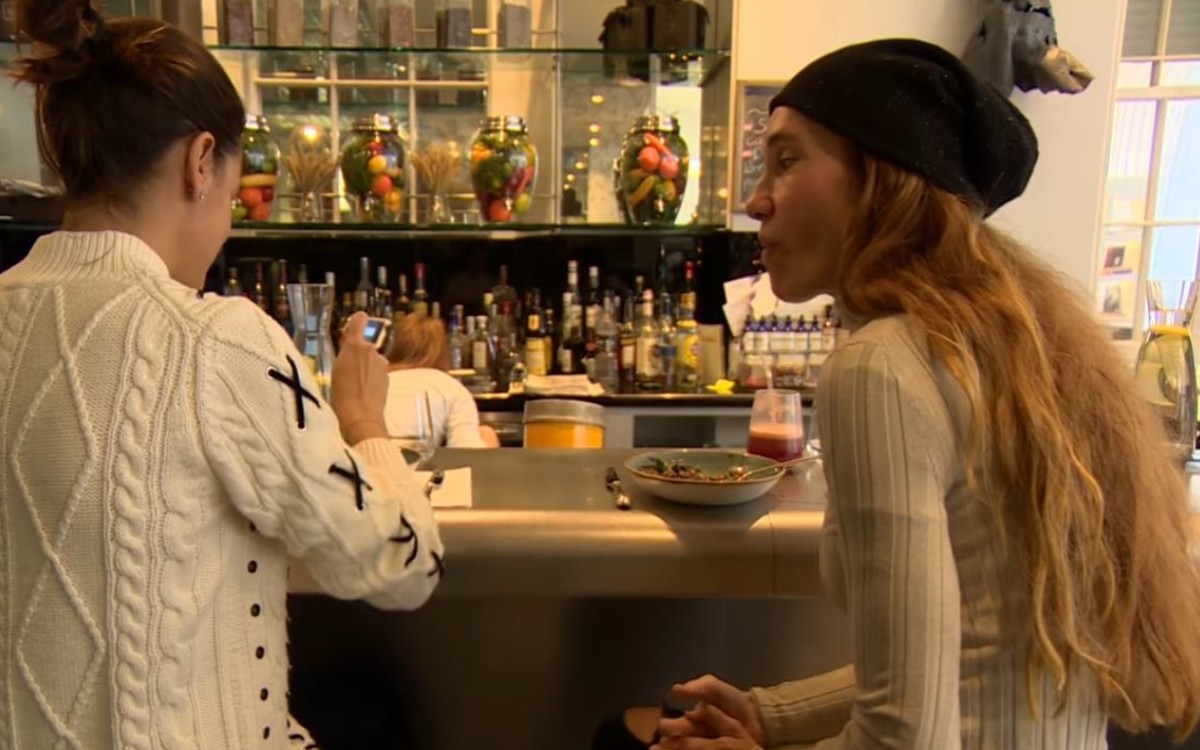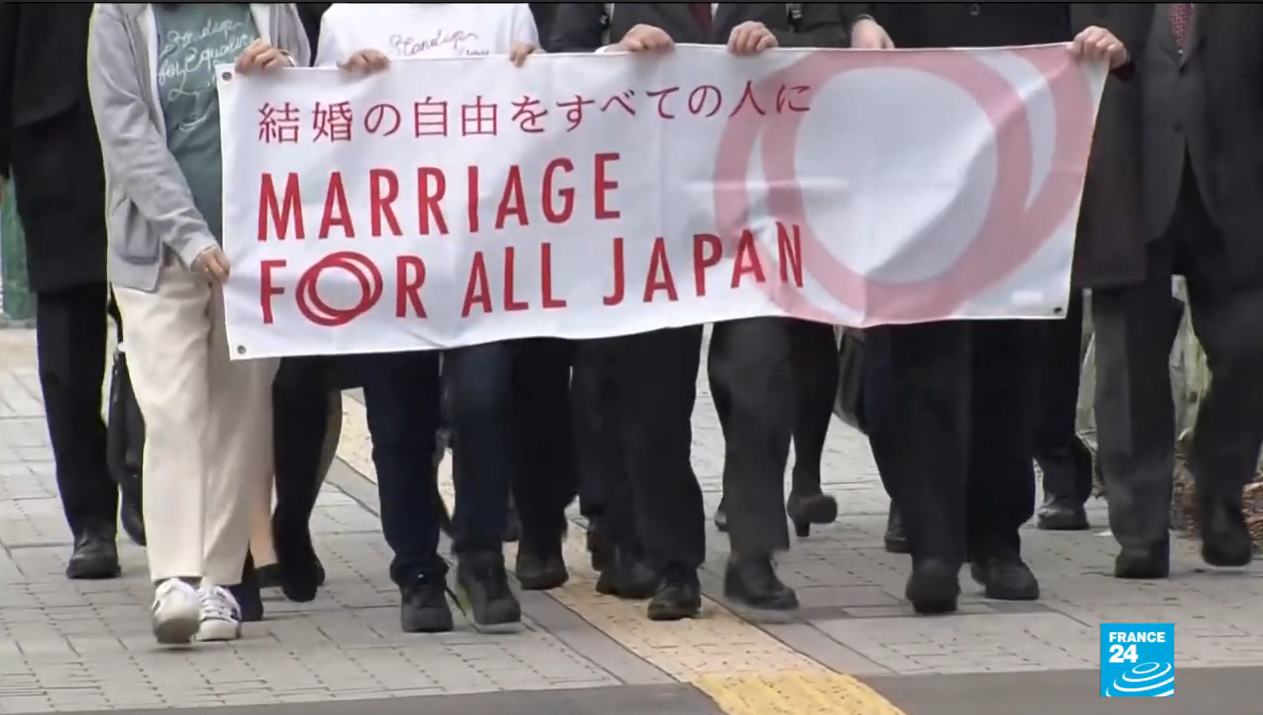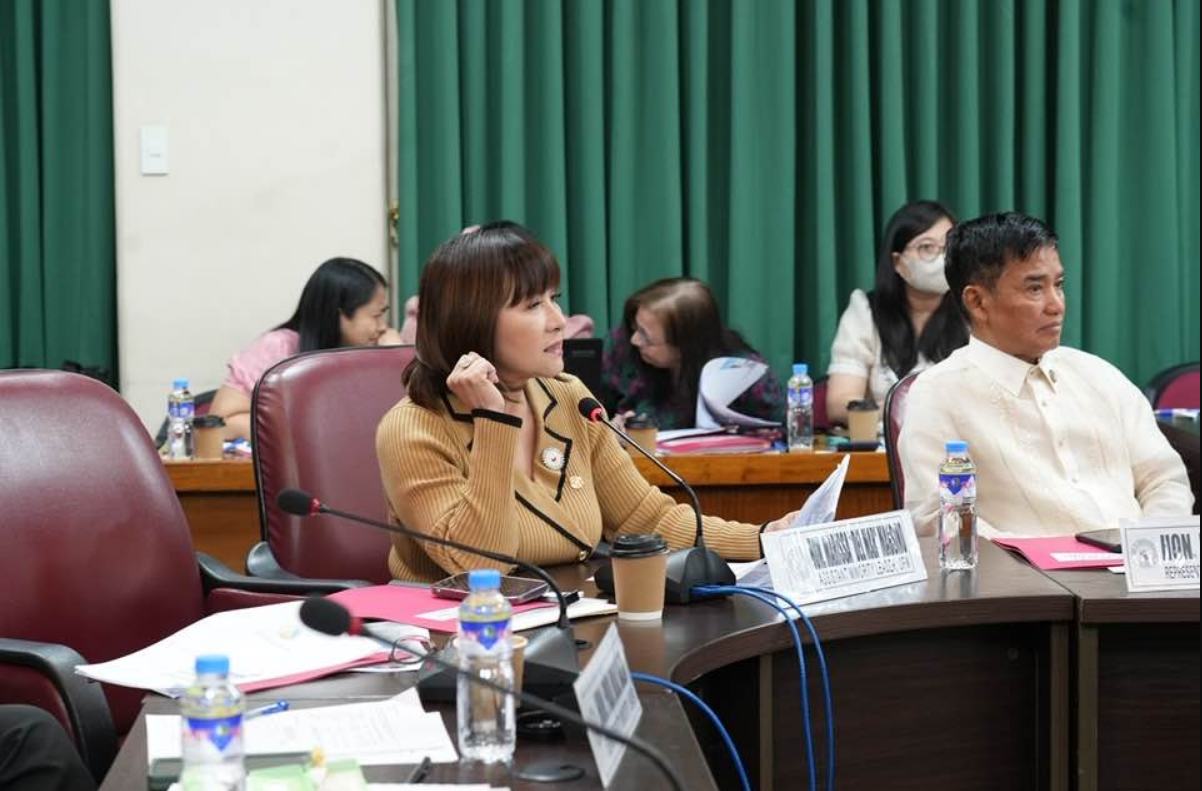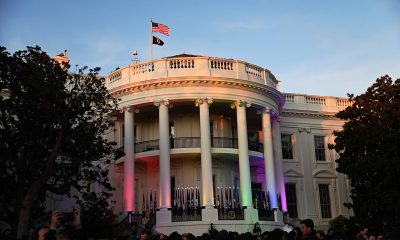World
Out in the World: LGBTQ news from Europe and Asia
JK Rowling mocked Scotland’s new hate crimes law

SCOTLAND

Harry Potter author JK Rowling took the opportunity of Scotland’s new hate speech law coming into force to harass several prominent British transgender people over X, but Scottish police say they’re not planning to charge her over her posts.
Rowling spent the morning of April 1 making a series of posts in mock celebration of the womanhood of well-known trans people, starting with some well-known convicted sex offenders and then listing several notable trans activists. At the end of her series of posts, Rowling gave up the joke.
“🎉🌼🌸April Fools! 🌸🌼🎉Only kidding. Obviously, the people mentioned in the above tweets aren’t women at all, but men, every last one of them,” she wrote. “If what I’ve written here qualifies as an offense under the terms of the new act, I look forward to being arrested when I return to the birthplace of the Scottish Enlightenment.”
As is her usual style, Rowling then spent the rest of the day reposting fawning congratulatory posts from other bigots and arguing with people who stood up to her.
Rowling was protesting the Hate Crime and Public Order (Scotland) Act 2021, which came into effect on April 1. The revision to Scottish hate crime law added protections for age, disability, religion, sexual orientation, gender identity and intersex people, both for aggravated punishment of hate-motivated crimes and for “stirring up hatred” against protected groups.
The law has drawn criticism from free-speech advocates, who say it will having a chilling effect on speech critical of protected communities. But supporters of the law saw that the threshold for prosecution is very high and it’s unlikely to be used for genuine political discourse or advocacy.
So far, that seems to have been borne out — Scottish police have already said that Rowling’s posts do not rise to the level of hate speech and she is not being charged.
In fact, the whole incident has just burnished Rowling’s reputation among anti-trans crusaders.
Not only did British Prime Minister Rishi Sunak commend the decision not to charge Rowling, but his statement to the BBC on the matter seems to back up Rowling’s hateful views.
“Nobody should be criminalized for saying commonsense things about biological sex,” Sunak told the BBC.
Trans issues have become a major issue in the UK over the past several years as a rising tide of self-described “gender-critical” activists — of whom Rowling is the most prominent — have successfully gotten the ear of the governing Conservative Party.
Last year, after the Scottish government passed a controversial law that would allow transpeople to change their legal gender by self-declaration, the British government disallowed the law, saying it would be incompatible with England and Wales’ rules around gender recognition.
Conservatives have also slow-walked their promised bill to ban conversion therapy after years of pressure from gender-criticals who got the government to remove protections for trans youth. A bill in unlikely to pass before elections expected later this year.
Scotland is holding consultations on its own conversion therapy ban bill, but divisions over LGBTQ issues are one of the causes of a rift in the governing Scottish National Party, which is seeing a challenge from the upstart ALBA party, which also wants Scottish independence but has leaned into anti-trans politics.
ENGLAND

An anti-trans activist has announced plans to open a private, members-only lesbian bar that refuses admission to trans women in London later this year, although details on where the bar will be located or when it will open have yet to be revealed.
The bar, to be called L Community, will be a private, members-only bar, which owner Jenny Watson, 32, says will allow her to skirt discrimination laws by restricting membership to cisgender lesbians.
Watson has gain notoriety in England for throwing lesbian focused events that exclude trans women.
Last year, Watson threw a lesbian speed-dating event that gathered controversy for its trans-exclusion policy, but was ultimately allowed to go ahead.
Watson says the backlash to that event has led to her other trans-exclusionary events being refused or cancelled by venues she’s tried to book. Having her own venue will allow her to host her own events.
“No one will take bookings for my events any more,” Watson told the Telegraph. “The trans activists are constantly targeting the events, so venues don’t want anything to do with them.”
“We should have a right to our own space — hence the idea to set up the bar. It will be for biological females only and this is why we’re making it a members-only club so we can legally restrict it to women,” she said.
On the web site for L Community, Watson lists potential events the bar could host, including speed dating, networking events, lesbian movie nights, open mics, trivia nights, book clubs and panel discussions.
Even though the bar has no opening date, L Community is already soliciting free and premium memberships, which its website says will come with priority access to events and L Community’s “social media platform.” Premium members are asked to make a “donation” of £120 (approximately $150.)
Anyone wishing to join must attest to being a biological female and upload government ID to the L Community website as proof.
Trans journalist Shivani Dave criticized the “crap new terf [trans-exclusionary radical feminist] bar” on their Instagram account and announced a plan to hold a trans-inclusive kiss-in in front of the bar “if it ever opens.”
“YOU THINK I’M JOKING? We are gonna go and make out in front of this TERF bar every single day until it closes. Lol that is if it ever even opens. Bigots be bigoting? Trans+ people are gonna be snogging,” they wrote.
THAILAND

Thailand got one step closer to legalizing same-sex marriage this week as the Senate voted 147-3 to advance the marriage bill through first reading. The bill now heads to a committee which has up to 60 days to study the bill before returning it to the senate for second and third reading.
Advancing LGBTQ rights has become a major issue in the southeast Asian country of 66 million over the last decade. Last year saw the opposition Move Forward Party win a plurality of seats in elections to Parliament’s lower house after it promised to legalize same-sex marriage. But the party was barred from government by a court ruling its leader breached the constitution by proposed changes to the country’s strict laws that forbid criticism of the monarchy.
The governing coalition that was later formed without Move Forward agreed to make marriage equality and LGBTQ rights a part of the coalition agreement anyway, and last month the lower house gave final, overwhelming approval to the same-sex marriage bill.
There had been some worry that the bill would face a rougher ride through the more conservative senate, which is made up of appointees of the Thai military, a holdover from the last junta that ran the country until 2017.
But the overwhelming support for the bill in the senate signals that it will likely pass and be sent to the king for royal assent before the summer, with it coming into effect before the end of the year.
Thailand will likely become the first state in southeast Asia to legalize same-sex marriage. Elsewhere in Asia, only Taiwan has legalized same-sex marriage, while the Nepalese Supreme Court has legalized it, although it can be difficult for couples to marry in practice.
Thailand’s push to enhance LGBTQ rights hasn’t stopped at marriage. Prime Minister Srettha Thavisin has ordered his Cabinet to draft a bill to allow trans people to change their legal gender, and the government is also considering changes to surrogacy law to allow same-sex couples and foreigners to access services to have children. The government is also directing resources toward ending HIV transmission in the country by making PrEP more widely available.
The government is eager to promote Thailand as an LGBTQ tourist destination, and is bidding to have Bangkok host World Pride 2028.
JAPAN

Five more prefectures and more than 40 municipalities began offering partnership certificates to same-sex couples on April 1, providing a limited measure of security for Japan’s LGBTQ couples as marriage remains out of reach.
While courts and the national government continue to fail to recognize same-sex marriage, local governments across the country are stepping up to fill the void with “partnership certificates” for same-sex couples. The certificates can help couples access local services reserved for couples and hospital visitation, but they are not considered legally binding. Couples do not access inheritance rights and are not treated as legal next of kin.
Beginning April 1, Aichi, Hyōgo, Nara, Ōita, and Tokushima prefectures began offering partnership certificates, bringing the total to 26 out of 47 prefectures recognizing same-sex couples. Additionally, 445 municipalities offer the certificates, according to Marriage for All Japan, a local advocacy group. More than two-thirds of Japanese people live in a jurisdiction that offers same-sex partnerships.
Some prefectures go further, offering “familyship” registries that allow same-sex couples to also register their children.
Same-sex marriage, however, remains out of reach for same-sex couples. National lawmakers have proven too conservative to advance LGBTQ rights.
Last year, a government bill that was meant to ban discrimination was given much fanfare ahead of the G7 conference in Tokyo. Conservative lawmakers pushed back and the bill was watered down to simply promote “understanding” of LGBTQ people, with no actual legal protections offered.
Meanwhile, a multi-year effort to advance same-sex marriage through the courts has delivered several key rulings finding that the ban on same-sex marriage is unconstitutional, but the courts have thus far failed to offer couples any remedy.
Last month, the first appellate-level court issued a ruling finding the marriage ban unconstitutional, but again did not order the government to allow same-sex marriage. The couples involved in the case have said they will appeal to the Supreme Court. Other marriage cases are still ongoing in other district and appellate courts.
For its part, the Supreme Court recently ruled that same-sex couples must be given access to a benefit paid to the survivors of crime victims on an equal basis as married heterosexual couples. Observers are already saying that the ruling will have implications for the full suite of benefits of marriage, including when it comes to taxes, housing, inheritance, pension and insurance.
PHILIPPINES

Filipino legislator Marissa Magsino of the opposition OFW Party has filed a bill in Congress seeking to recognize the property rights of same-sex couples, which would be a landmark of progress in the deeply Catholic Asian country if passed.
The bill was filed March 20 but has not yet been called for a first reading, it is a companion to a similar bill filed in the Senate in November 2022, which has been stuck in committee since.
Both bills would only offer limited property rights to same-sex couples. Couples would be deemed to share ownership and responsibility for any property acquired during the partnership, unless a written agreement is signed saying otherwise. A partnership would only be deemed to exist if partners cohabit for at least one year.
The bill aims to treat partners equitably in the event of a breakup.
While this is a very limited set of rights, the Philippines does not currently offer any recognition of same-sex couples or their property rights.
“Though through the years there has been change in the mindset of people on long-standing stereotypes and generalizations with social perceptions becoming more accommodating of the LGBTQ+ community, there’s still no legislation that guarantees equal rights for everybody regardless of sexual orientation or gender identity,” Magsino said in a statement to the Manila Bulletin on April 2.
“This legislation is a significant step towards achieving greater equality and justice for all Filipino citizens, regardless of their sexual orientation or gender identity. It is imperative that we ensure equal protection under the law for every individual in our society,” she said.
Proposals to create more expansive civil unions that recognize a broader set of rights similar to marriage for same-sex couples have occasionally been lodged in Congress, but none has ever been brought to a vote.
In 2019, the Supreme Court dismissed a petition seeking a right to same-sex marriage for lack of standing, as the petitioner did not seek to get married himself. The petitioner and his counsel were cited for indirect contempt of court over the matter.
The Philippines Congress has struggled to advance any pro-LGBTQ+ legislation for years. A bill that would add discrimination protections for sexual orientation, gender identity and gender expression, dubbed the SOGIE Bill, has been introduced multiple times since 2001, and has even passed the House of Representatives multiple times, but has always stalled in the more conservative Senate.
Dozens of provinces and municipalities have passed local non-discrimination ordinances across the country.
El Salvador
Gay Venezuelan makeup artist remains in El Salvador mega prison
Former police officer said Andry Hernández Romero was gang member because of tattoos

A new investigation points to a discredited, former police officer who played a “key role” in the wrongful deportation of Andry Hernández Romero, a gay asylum seeker and makeup artist who was sent to a maximum security mega prison in El Salvador under Trump’s Alien Enemies Act.
USA Today found in a recent investigation that the former Milwaukee police officer who filed the report about Hernández, citing his tattoos as the reason for the gang affiliation, has a long history of credibility and disciplinary issues in his former police officer position.
The private prison employee who previously worked as a police officer until he was fired for driving into a house while intoxicated — among other alcohol-related incidents — “helped seal the fate” of Hernández.
The investigation by USA Today found that the former police officer accused Hernández of being a part of the Tren de Aragua gang because of his two crown tattoos with the words “mom,” and “dad,” which are now being identified as Venezuelan gang-related symbols.
Since then, his story has made headlines across the nation because Hernández has no criminal record and is legally seeking asylum in the U.S. due to credible threats of violence against him in Venezuela because of LGBTQ persecution.
He was targeted shortly after Trump invoked the Alien Enemies Act of 1798, which is a proclamation for all law enforcement officials to “apprehend, restrain, secure, and remove every Alien Enemy described in section 1 of [the] proclamation.”
Charles Cross, Jr., the former police officer, signed the report which wrongfully identified Hernández as a gang member. Cross was fired in 2012 after many incidents relating to his credibility and how it was affecting the credibility of the department to testify in court.
He had already been under investigation previously for claiming overtime pay that he never earned. In 2007, he had also faced criminal charges for damage to property, according to court records.
In March, the Washington Blade spoke with the Immigrant Defenders Law Center Litigation and Advocacy Director Alvaro M. Huerta regarding the case and stated that “officials with U.S. Immigration and Customs Enforcement and U.S. Customs and Border Protection alleged his organization’s client was a member of Tren de Aragua, a Venezuela-based gang, because of his tattoos and no other information.”
Hernández came to the U.S. last year in search of asylum and now makes up one of 238 Venezuelan immigrants who were deported from the U.S. to El Salvador, Honduras and Venezuela. Many of those being deported are being sent to the Center for Terrorism Confinement, a maximum-security mega prison in El Salvador, which has been accused of human rights violations.
According to the investigation, the Department of Homeland Security “wouldn’t offer further details on the case, or the process in general, but reiterated that the department uses more than just tattoos to determine gang allegiance.”
His story is now being looked at as a cautionary tale of the lack of due process of law the U.S. government is taking, as the Department of Homeland Security and Immigration and Customs Enforcement ramp up deportations across the nation.
Organizations like the Human Rights Campaign are now calling for Secretary of State Marco Rubio and Secretary of Homeland Security Kristi Noem to cease wrongful deportations and return Hernández home. The petition also urges the U.S. government to afford all Americans, forging nationals and asylum seekers residing in the U.S., due process of law as required by the Constitution.
Argentina
Gay, nonbinary parent fights for family in Argentina’s courts
Leonardo Hatanaka alleges they were fired after requesting paternity leave

An unprecedented case could set an important legal precedent for the rights of labor rights for LGBTQ families in Latin America.
Leonardo Hatanaka, a Brazilian pharmaceutical professional, expects an imminent ruling from the Superior Court of Justice in the Autonomous City of Buenos Aires in a case that alleges discriminatory dismissal based on sexual orientation, gender identity, and xenophobia after their son Matteo’s birth in Argentina via “solidarity gestation.” Human rights organizations and international agencies have followed the case closely.
Genzyme de Argentina S.A. and Sanofi in 2023 fired Hatanaka weeks after they notified them of their son’s paternity and requested 180-day parental leave.
“Matteo’s birth was the realization of a dream and the right to form a family with love, dignity and equality, even if that means having to fight every day for our family to be recognized as such,” Hatanaka told the Washington Blade in an exclusive interview.
The National Institute Against Discrimination, Xenophobia and Racism, a government agency known by the acronym INADI that President Javier Milei’s administration has shut down, in November 2023 said Hatanka’s termination was motivated by discrimination based on sexual orientation and gender identity.
(Milei took office in December 2023.)
The General Directorate of Coexistence in Diversity in Buenos Aires’s government in 2024 said institutional xenophobia motivated the firing.
“I am a gay man, foreign, nonbinary, and I had requested to exercise my right to parental leave,” Hatanaka explained. “The company denied access to a basic right to care, which it does provide in other countries, and did not provide any medical coverage for our son, despite his legal registration with both parents’ names.”
Sanofi did not acknowledge responsibility, offer apologies or any kind of reparations, despite the two rulings.
“It was devastating. I was caring for a newborn, at a moment of enormous vulnerability, and the company chose just that moment to abandon us,” said Hatanaka.
The National Labor Court overturned an initial injunction that ordered Hatanaka’s reinstatement. Hatanaka appealed the decision to the Superior Court of Justice in the Autonomous City of Buenos Aires.
“I hope for justice; that the discrimination suffered is recognized, and that this ruling serves as a precedent for all diverse families and LGBTQ+ people who are seeing their rights violated,” said Hatanaka.
The Argentine LGBT Federation, SOS Homophobie in France, and Mothers of Resistance in Brazil are among the organizations that have expressed their support. The latest U.N. report on anti-LGBTQ discrimination also notes the case.
“Companies must go beyond marketing,” Hatanaka emphasized. “Real inclusion requires concrete actions, consistency, and respect for their own policies.”
Hatanaka stressed that “there are instruments such as the UN Guiding Principles on Business and Human Rights. It is time for them to comply with them.” The lawsuit has also become a symbol of the struggle for equality and protection of families with parents who are the same sex.
“I feel I represent many LGBTQ+ families who live in fear of losing everything by exercising their rights,” said Hatanaka. “LGBTQ+ parenting is legitimate, real and deserves protection. No family should be punished for existing.”
Myanmar
LGBTQ advocacy group joins Myanmar earthquake relief effort
March 28 quake killed thousands, devastated country’s second-largest city

A powerful earthquake that rocked Myanmar on March 28 unleashed devastation across the central part of the country.
The U.S. Geological Survey measured the quake at 7.7, and pinpointing its epicenter roughly 10 miles west of Mandalay, the country’s second-largest city. A 6.4-magnitude aftershock jolted the area 12 minutes later, compounding the destruction and deepening the crisis for a nation already strained by conflict.
The earthquake struck with terrifying intensity near its epicenter, wreaking havoc on Mandalay and the nearby city of Sagaing.
Mandalay, a bustling city of approximately 1.5 million residents, bore the brunt of the destruction. Among the most striking losses was the 12-story Sky Villa Condominium, which collapsed, leaving scores trapped beneath the wreckage. Rescue workers scrambled to pull survivors from the rubble, but the rising death toll underscored the tragedy’s magnitude.
In Sagaing, which is located closer to the epicenter, more than 70 percent of buildings sustained damage. The Ava Bridge, an essential artery spanning the Irrawaddy River, collapsed, cutting off a critical connection to Mandalay. The earthquake’s shallow depth of less than seven miles amplified its power, reducing homes, temples, and schools to rubble.
The earthquake’s death toll continues to climb, with at least 3,649 confirmed dead, more than 5,000 injured, and approximately 145 people missing. Amid the widespread devastation, questions loom about the impact on vulnerable populations. The Washington Blade reached out to Colors Rainbow, an organization advocating for LGBTQ rights in Myanmar, to understand how the crisis has affected one of the nation’s most marginalized communities.
Colors Rainbow Executive Director Hla Myat Tun spoke about how his organization is working to address the crisis faced by Myanmar’s LGBTQ community in the aftermath of the earthquake.
Colors Rainbow has implemented a system of multipurpose cash transfers, directing funds to local LGBTQ partner organizations. These grassroots partners, in turn, provide essential support to affected individuals that includes emergency cash assistance, food, non-food items, clean water, and basic emotional support tailored to the immediate needs of their communities.
“We estimate that around 500–800 LGBTQ individuals have been impacted in the affected areas, particularly in Mandalay Region, Sagaing Region, and southern Shan state,” said Hla Myat Tun. “So far, we have been able to directly assist around 80–100 LGBTQ individuals.”
Hla Myat Tun told the Blade that Colors Rainbow is actively gathering data to assess the specific challenges that LGBTQ people are facing in the aftermath of the earthquake.
Preliminary observations, he noted, point to heightened vulnerability among LGBTQ people, driven by social exclusion and limited access to mainstream humanitarian aid. Hla Myat Tun, however, emphasized more comprehensive information is necessary to fully understand the scope of their needs and vulnerabilities in this crisis.
“We are partnering with international LGBTQ and feminist organizations that focus on displaced communities,” said Hla Myat Tun. “These partners provide emergency funds, and we coordinate with local LGBTQ groups to deliver aid directly to affected individuals on the ground.”
Addressing reports of military restrictions on humanitarian aid, Hla Myat Tun explained how Colors Rainbow is managing to reach LGBTQ people who are in conflict zones and areas the military junta controls. Hla Myat Tun highlighted the importance of the organization’s trusted local LGBTQ partners, who are embedded in these regions. Their presence and established networks, he said, are vital in navigating restricted areas and ensuring that aid reaches the LGBTQ people who are most in need.
Hla Myat Tun also provided insight into how Colors Rainbow is tailoring its relief efforts to meet the LGBTQ community’s specific needs.
He said his organization is gathering information directly from LGBTQ people through close coordination with its local partners, relying on both formal and informal communication channels. Hla Myat Tun told the Blade his team conducts daily check-ins via quick telephone calls, ensuring a continuous flow of information to guide their response efforts despite limited internet access, electricity and other challenges.
“Our approach is collaborative — we set strategies and share responsibilities to respond flexibly and safely, based on the rapidly changing local context,” he said. “Personal stories are being documented, but for security reasons, we are cautious about sharing them publicly.”
When asked whether staff or volunteers had harassment, discrimination, or violence while delivering aid — a concern given the precarious legal and social climate for LGBTQ people in Myanmar — Hla Myat Tun said there have been no reported incidents thus far.
“So far, we haven’t received any reports from our staff or local partners about harassment or violence while delivering aid,” he noted, emphasizing Colors Rainbow remains vigilant and has implemented robust safety protocols to protect all involved.
Colors Rainbow relies primarily on funding from international LGBTQ-focused partners. He noted, however, humanitarian funding specifically dedicated to LGBTQ communities remains vastly under-resourced, relative to the pressing needs on the ground. Hla Myat Tun said this shortfall severely limits the scale and reach of Colors Rainbow’s efforts.
“While Myanmar’s legal framework remains outdated, societal attitudes — especially during the civilian government — have shown signs of progress,” said Hla Myat Tun. “We have seen positive change thanks to the work of local LGBTQ organizations.”
“In the current crisis, many communities are working together despite legal barriers. However, in areas without LGBTQ-led organizations, inclusive humanitarian responses are still lacking,” he added. “There’s an urgent need for international humanitarian actors to understand and implement LGBTQ-inclusive practices in Myanmar.”
When asked about long-term strategies to support the recovery and resilience of LGBTQ communities as Myanmar rebuilds, Hla Myat Tun affirmed Colors Rainbow is deeply committed to fostering resilience. The organization’s initiatives include leadership development, community empowerment through training and workshops, sub-granting programs, and organizational development support. He also highlighted Colors Rainbow’s advocacy for LGBTQ-inclusive policies and collaboration with ethnic groups to promote an inclusive federal democracy, and specifically thanked Outright International, a global LGBTQ and intersex rights group, for “amplifying our work.
“This kind of international attention shines a spotlight on the challenges LGBTQ communities in Myanmar are facing and helps open doors for more support,” Hla Myat Tun told the Blade. “It also boosts visibility and solidarity, both locally and globally, which we deeply appreciate.”
-

 The White House5 days ago
The White House5 days agoWhite House does not ‘respond’ to reporters’ requests with pronouns included
-

 Arts & Entertainment5 days ago
Arts & Entertainment5 days ago‘Gay is Good’ Pride Pils Can Celebrates Frank Kameny’s 100th Birthday for WorldPride in D.C.
-

 District of Columbia2 days ago
District of Columbia2 days agoReenactment of 1965 gay rights protest at White House set for April 17
-

 Hungary2 days ago
Hungary2 days agoHungarian MPs amend constitution to ban public LGBTQ events












